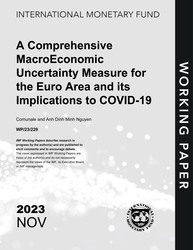
A Comprehensive Macroeconomic Uncertainty Measure for the Euro Area and its Implications to COVID-19
A Comprehensive Macroeconomic Uncertainty Measure for the Euro Area and its Implications to COVID-19
READ MORE...
Volume/Issue:
Volume 2023
Issue 229
Publication date: November 2023
ISBN: 9798400258176
$20.00
Add to Cart by clicking price of the language and format you'd like to purchase
Available Languages and Formats
| English |
Prices in red indicate formats that are not yet available but are forthcoming.
Topics covered in this book
This title contains information about the following subjects.
Click on a subject if you would like to see other titles with the same subjects.
Economics- Macroeconomics , Economics / General , Industries- General , macroeconomic uncertainty , euro area , Bayesian VARs , COVID-19 , IMF working paper No , 2023/229 , macroeconomic uncertainty shock , increase in MEU , uncertainty shock , meu index , Industrial production , Global financial crisis of 2008-2009 , Global , Europe
Summary
This paper develops a new data-driven metric to capture MacroEconomic Uncertainty (MEU) in the euro area. The measure is constructed as the conditional volatility of the unforecastable components of a large set of time series, accounting for the monetary union as well as cross-country heterogeneity. MEU exhibits the largest spike at the time of the COVID-19 outbreak and is noticeably different from other more financial-oriented and policy-driven uncertainty measures. It also reveals a significant increase in inflation uncertainty in 2021-2022. Our BVAR-based analysis shows that an unexpected increase in the MEU has a negative and persistent impact on euro area's industrial production, accounting for 80 percent of its reduction during the first wave of COVID-19, therefore supporting the interpretation of COVID-19 shock as a macroeconomic uncertainty shock. Public debt increases in response to this uncertainty shock. Finally, an increase in MEU negatively affects Emerging Europe countries, contributing the most to the decline in their economic activity during this COVID-19 period.
Copyright © 2010 - 2026
Powered by:
AIDC



